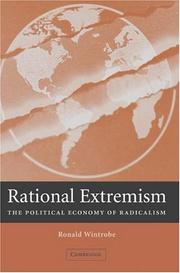| Listing 1 - 2 of 2 |
Sort by
|

ISBN: 0521859646 9780521859646 9780511511028 9781107407220 0511250037 9780511250033 9780511250545 0511250541 0511247893 9780511247897 0511511027 9781107167469 1107167469 9786610703562 6610703566 9780511248979 0511248970 1107407222 1280703563 0511319223 0511249527 Year: 2006 Publisher: Cambridge Cambridge University Press
Abstract | Keywords | Export | Availability | Bookmark
 Loading...
Loading...Choose an application
- Reference Manager
- EndNote
- RefWorks (Direct export to RefWorks)
Extremists are people whose ideas or tactics are viewed as outside the mainstream. Looked at this way, extremists are not necessarily twisted or evil. But they can be, especially when they are intolerant and violent. What makes extremists turn violent? This 2006 book assumes that extremists are rational: given their ends, they choose the best means to achieve them. The analysis explains why extremist leaders use the tactics they do, and why they are often insensitive to punishment and to loss of life. It also explains how rational people can be motivated to die for the cause. The book covers different aspects of extremism such as revolution, suicide terrorism, and global jihad. The arguments are illustrated with important episodes of extremism, including the French Revolution, the rise of nationalism in Yugoslavia under Milosevic, and the emergence of suicide terror and Al Qaeda today.
Group identity --- Political violence --- Radicalism --- Terrorism --- #SBIB:321H81 --- #SBIB:321H91 --- #SBIB:324H72 --- #SBIB:327.5H20 --- Violence --- Political crimes and offenses --- Collective identity --- Community identity --- Cultural identity --- Social identity --- Identity (Psychology) --- Social psychology --- Collective memory --- Acts of terrorism --- Attacks, Terrorist --- Global terrorism --- International terrorism --- Political terrorism --- Terror attacks --- Terrorist acts --- Terrorist attacks --- World terrorism --- Direct action --- Insurgency --- Subversive activities --- Terror --- Extremism, Political --- Ideological extremism --- Political extremism --- Political science --- Westerse politieke en sociale theorieën vanaf de 19e eeuw : nationalisme, corporatisme, fascisme, nationaal socialisme, rechtsextremisme, populisme --- Niet-specifieke politieke en sociale theorieën vanaf de 19e eeuw: islam, Arabisch nationalisme --- Politieke verandering: conflictlijnen, nationalisme/federalisme --- Vredesonderzoek: algemeen --- International movements --- Microeconomics --- Economic order --- Radicalism. --- Political violence. --- Terrorism. --- Group identity. --- Business, Economy and Management --- Economics
Book
ISBN: 0228007100 0228007097 9780228007104 9780228007098 9780228006084 0228006082 9780228006077 0228006074 Year: 2021 Publisher: Montreal Kingston London Chicago
Abstract | Keywords | Export | Availability | Bookmark
 Loading...
Loading...Choose an application
- Reference Manager
- EndNote
- RefWorks (Direct export to RefWorks)
Robert (Bob) Andrew Young (1950-2017) was Canada Research Chair in Multilevel Governance at the University of Western Ontario and one of Canada's most distinguished political scientists. In Across Boundaries Young's former colleagues and students bring together contributions from his extensive network. These essays speak to Young's legacy while providing new insight into research in multilevel governance, secession, and political economy.
Central-local government relations. --- Federal government. --- Political science.
| Listing 1 - 2 of 2 |
Sort by
|

 Search
Search Feedback
Feedback About UniCat
About UniCat  Help
Help News
News